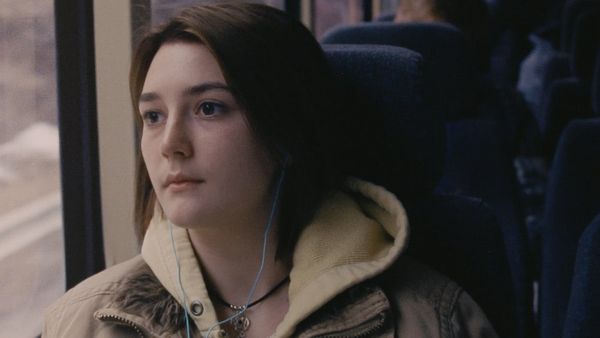Eye For Film >> Movies >> Never Rarely Sometimes Always (2020) Film Review
Never Rarely Sometimes Always
Reviewed by: Jeremy Mathews

Just in case anyone thought things were easy for teenage girls, Eliza Hittman’s Never Rarely Sometimes Always brings the perils, challenges and fears of their lives into stark focus. It is a portrait of loneliness and alienation, yes, but also of resourcefulness, resilience and unity.
From a plot perspective, the movie is quite simple: Autumn (Sidney Flanigan), a 17-year-old in a small Pennsylvania town, discovers she is pregnant and has to travel to New York City with her cousin Skylar (Talia Ryder) to get an abortion. But the film’s emotional potency doesn’t come from plot. Hittman’s achievement is that she vividly captures the world Autumn is navigating. Even the smallest character feels like a genuine person with their own feelings and life. And that makes the situation Autumn is trapped in even more devastating.

This depiction of teen pregnancy could be seen as the opposite of Jason Reitman’s Juno from 2007. Where Juno was loaded with cute dialogue and well defined relationship arcs, Never Rarely provides a very quiet, understated portrait of a young woman dealing with hardship the only way she can. Autumn isn’t written to make us instantly fall in love with her, but to make us understand her.
The movie introduces her on stage at her high school talent show. After all the typical acts have gone on, she stands alone with an acoustic guitar, singing and playing a dark, raw folk cover of He’s Got the Power. The dark connotations of The Exciters’ 1960 doo-wop track suddenly come to the fore as she belts out the song with sloppy chords but nailed-on emotion. After the show, we see her well-meaning but oblivious mother and her aggressively apathetic step-dad, as well as the boys at school who call her a slut and laugh about her.
Hittman never identifies who impregnated Autumn, or goes into detail about her sexual history, but instead displays an environment in which young women always feel the desire and power-abuse of predators. From the manager of the grocery store where Autumn and Skylar work to the flirtatious rich white kid on the bus, we witness transgressions big and small that add up to a world that feels oppressive and dangerous. There might be an understandable impulse to include positive male figures who offer more hope, but Hittman is after something different: a world where women most often have to help themselves.
Skylar quietly emerges as the film’s unheralded savior. She sacrifices her time and money and has to continue sacrificing as things don’t go as simply as planned, all to help out her moody, depressed companion, who isn’t particularly forthcoming with thanks, support or conversation. Ryder’s delicate performance helps convey a sympathy of shared experience — Skylar doesn’t judge, perhaps because she can picture herself in the same predicament.
The film’s most remarkable moment comes in the form of a standard set of questions asked at the Planned Parenthood clinic. The film gets its title from the multiple-choice answers, which pertain to sexual activity and history. It is one of the most hard-hitting moments in recent cinema, and Hittman earns it with the same discipline she brings to the rest of the film. Instead of going for loud manipulation, she achieves a quiet truth.
Reviewed on: 01 Mar 2020
















